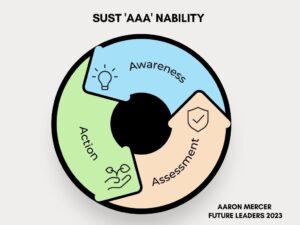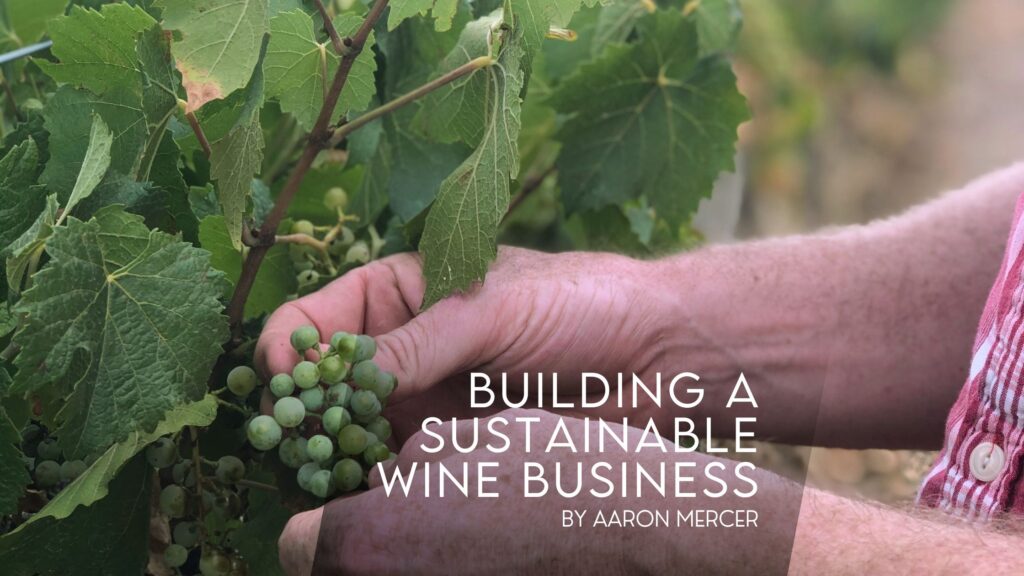At the time of writing, we’ve just come out of two years of on-and-off lockdown due to COVID-19, geopolitical tensions are deeply troubling, and inflation is sky-high, as we await another global recession. Add to the socio-political meltdown mounting problems associated with human induced Climate Change, and it’s easy to conclude that the future generations have been dealt a rough hand. They have responded with their wallets (and their recent Teal vote). There’s a ground swell, a push to buy local, support small business, make ethical choices, and the wine sector is well positioned to benefit. With cleaner and greener messaging, supported by an ethic of continuous improvement, wine businesses that adopt a culture of sustainability stand to benefit the most.
What does it mean to be a Sustainable Wine Business?
This is a thought I’ve carried for some time, and recently have started working through as we’ve started our own wine brand and take it to market attempting to tell our Sustainable narrative with the push-pull of real market forces. With naivety we’re attempting to save the world, one bottle at a time. In approaching this writing piece my natural tendency was to revert to my university days and produce a hefty, fact laden argument that would somehow compel the reader to take my position through the sheer weight of scientific evidence. Instead, I realised that I didn’t have the facts and that there’s no single way. I, like you, am a passenger as the wine sector navigates a future Building Sustainable Wine Businesses. So instead, I’ll take the reader through some personal angst around the misuse or ‘greenwashing’ of the term Sustainability, what I believe the term to mean within the current context of the wine sector and how Sustainability might just be the one-size-fits-all solution to a healthier business, a powerful marketing platform and a platform for continuous improvement.
The ‘Greenwashing’ Angst
Although uncommon, some of the current Sustainability marketing is somewhat akin to the virtue signalling we witness from business in relation to Gender Equality, First Nations or LGBTQIA+. It’s a token to put on the mantle, or to sell another bottle of wine, and it’s this misuse from savvy marketing folk that I find abrasive. Let me set the scene… You’ve just entered your favourite neighbourhood wine bar and start up a chat with the resident sommelier. They recommend a wine to you. It goes something like…
SOMM: “Hey we’ve just got in this exciting, super sustainable new lo-fi producer who’s doing great things.”
YOU: “Yeah. I’ll give it a go. Can you tell me more about the wine.”
SOMM: “Well it’s grown organically, and nothing is added. The fruit is from the Yarra, but they bring it back to their Sydney warehouse to ferment naturally in a concrete egg. Super interesting. Plus, the bottle is just super cute. It’s chunky and the cork is sweet. Super good quality.”
YOU: “So that makes it Sustainable…?”
Stop. Wait a minute. Is that what Sustainability in the wine sector looks like? Is this the messaging wine businesses want their consumers to believe? If not, why have we spread this misinformation and perpetuated falsities? The sommelier and retailer are simply repeating the dialogue we’ve provided. Clearly, we shoulder the brunt of this weight.
Reality Vs Perception: Is the Wine Consumer Being Misled?
Unpacking the above dialogue reveals the holes in the perception of Sustainability versus reality. Navigating this dialogue feels like driving with fog-lights, peering through the mist of buzz words and misinformation. So often they take precedence over the real story. Fortunately, there’s hope. There’s a framework to measure true Sustainability, to burn-off the fog and tell a more authentic story to the consumer. The surprising hero here is bureaucracy, the rigorous auditing of Sustainable Winegrowing Australia (SWA).
What Does Sustainability Look Like In The Wine Sector?
The Current Landscape
After some years of regional Sustainability programs such as Sustainable Australia Winegrowing (SAW) and Entwine, in 2019 the Sustainable Winegrowing Australia (SWA) program was born. With some early adopters, the program has now picked up a head-ofsteam, representing more than a third of the vineyard area in Australia, this represents a core group of wine brands1. What a success, a trustworthy, Sustainability certification program backed by research, and with significant adoption from the wine sector. We could stop there, settle for this growing uptake and in just a few years near 100 per cent industry adoption, but why should we? By their own admission SWA is about ‘continuous improvement’, best summed-up in their definition of Sustainability.
“Sustainability is a journey with continuous improvement at its heart. It’s a commitment to improving the environmental, social and economic aspects of a business and its impacts on the community around it.” – Sustainable Winegrowing Australia (2021 Impact Report)
What else? How can we improve on the SWA program?
Well, we can do plenty. The SWA program, albeit a robust certification process, falls short in a few key areas.
Improvements on Current ‘Best Practice’
The SWA program sets the foundations on which we can build Sustainability, or more aptly a pivot on which we can improve on our Sustainable outcomes as a wine business.
On one side of the SWA fulcrum are the decisions we need to make before we even begin farming the vineyards. Decisions such as which varieties to grow where, as we plant new sites or rework the enormity of aging vineyards across Australia. At this time, we must also consider the varieties that will be suitable 20 to 30 years from now as we face a changing climate. The other side encompasses carbon neutrality, or Scope 3 emissions which would focus on packaging, glass, and other suppliers down the value chain. Possibly even the development of a ‘Green’ economy, where trading occurs within the circle of Sustainable businesses. This culture of continuous improvement allows for expanded thinking, it allows for a wine business to start and start again, realising they can always improve.
The Sustainable Marketing Advantage
As old as time is the marketing saying, “it’s not about the sausage, it’s about the sizzle.” Inferring that the product is less important than the marketing spin, a position still employed by some in the wine sector.
What if, however, Sustainability can be more than that? What if improving the environmental, social and economic aspects of a business could also help sell a bottle of wine? What if Sustainability could be both the sausage and the sizzle? Good news, it can be.
Developing a culture of continuous improvement around Sustainability allows a wine business to tell an authentic story. A truthful story, without the need for trickery or consumer misinformation. Do what you say and say what you do.
The Culture of Continuous Improvement
Conventional thinking would have the reader make just one choice, the defining path from which there is no return. A choice you’ll be presented with just once. Should I choose the Blue Pill or the Red Pill?
Fortunately, this isn’t the Matrix, and the door won’t close on you. With a committed effort to creating a culture of continuous improvement there will be plenty of pills presented as you create your unique business. This culture will allow businesses to think broad and deep on what Sustainability means, and realise that when you reach the peak, you’re not finished, it simply offers a vantage point from which you can view the next mountain, the next chapter of your Sustainability journey. Thanks to our partners, you can find online to suit every preference and budget, from budget to top-of-the-range super stylish models.

This figure represents the continuous improvement model of Sustainability, the endless feedback loop of Awareness, Action and Assessment. Knowledge breeds implementation, from which the business can assess their actions and find the holes in their knowledge, hence once again seeking information.
The key to this infinite chapter in the book of continuous improvement is Sust’AAA’inability, where awareness, action and assessment live in perpetual motion. The adoption of Sust’AAA’inabilty within your wine business allows for constant feedback and reflection. It breeds a healthier and more conscious business overall, one that is adapting to changing environments.
Awareness: Seeking and sharing information around Sustainability is key to progressing a business’ Sustainability credentials. Be a sponge, read broadly and converse, also learn from your own business and adapt.
Action: Implement new practices or improvements throughout your business. There’s no recipe, test ideas and see how the business and the market reacts, this is where true innovation is borne, within business not theory.
Assessment: Reflect on your business and the improvements made, and measure where you might need to adjust. This is the phase that identifies shortcomings and focuses the areas for future learning and improvement.
Where to now?
With optimism or naivete I’d hope to praise the reader for making a wise choice and getting on board, I understand however that this piece is just berley and at best it has lured you to explore Sustainability further, to develop a culture of continuous improvement within your business. For the converted, we hope this Thought Leadership piece will assist in your Sustainability journey, where you can discover your path and tell your authentic story. Like Frodo we set off on our journey a few years back, we joined the Fellowship of Sustainability. The journey has been tough to navigate at times, but oh so rewarding.
As we continue our journey Building a Sustainable Wine Business my outlook continues to be buoyant. There’s a unique camaraderie arisen, wonderful conversations and a united wine sector as more and more businesses hitch onto the Sustainability wagon. Navigating Sustainability isn’t the Wild West anymore, there’s a clear coach trail and plenty of brave pioneers who have established welcoming outposts. I’m excited to embark on a journey of continuously improving the environmental, social and economic aspects of our business and the community abroad, one bottle at a time.
1. https://sustainablewinegrowing.com.au/ August 31, 2022
Since its inception the Future Leaders program has been funded and coordinated by Wine Australia, with the endorsement of Australian Grape and Wine and lead by Pragmatic Thinking since 2017. Mercer Wines thank these organisations for their continual improvement to the wine industry.
For more information or media enquiries please contact media@mercerwines.com.au
